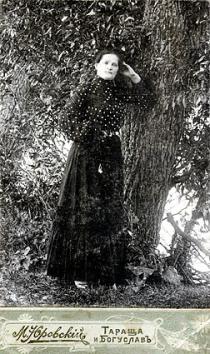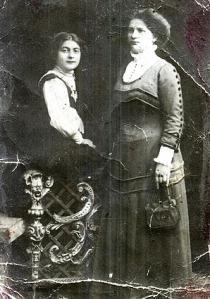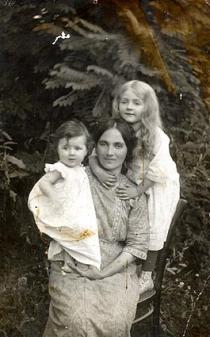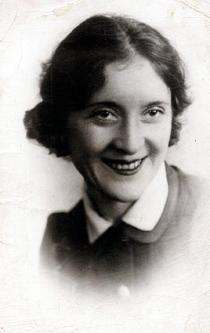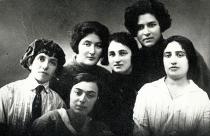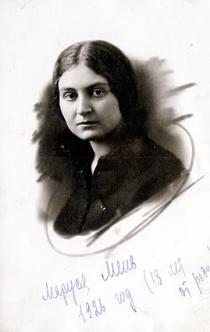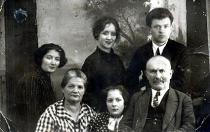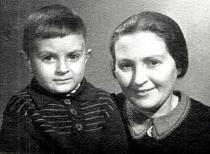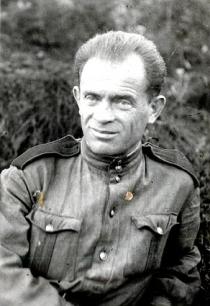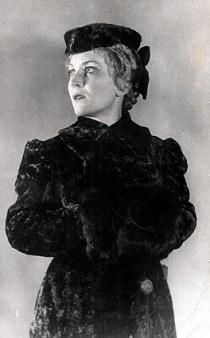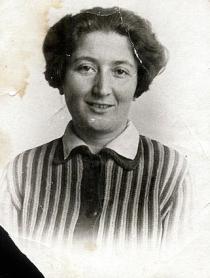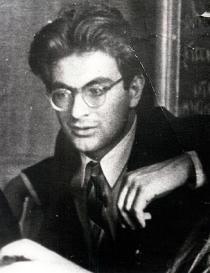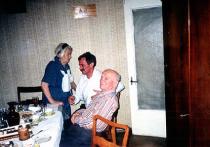
Abram Karmazin
Biography
I was born in the family of Moisey and Eidy in the town of Medvin, Boguslav district, Kiev province, on 14 November 1900. This was a small and poor Jewish town near a big Ukrainian village Boguslav with the population of about 10-15 thousand people. The population of the town was about 1500 Jews. They were mainly handicraftsmen, tailors or shoemakers. There were very few people with education. Most Jews in town were fanatically religious.
Family background
My grandfather on my father’s side Pinhus Karmazin, born in 1833, was an educated man. He was born in Medvin. His teachers taught him writing, reading and arithmetic at home. He read a lot and was religious. He went to the synagogue and prayed. He wore a yarmulke on his head. He was very intelligent and kind. We loved him a lot and he loved us, his grandchildren. My grandfather owned a food store and a store where he sell pieces of leather. Once a week he went to Berdichev to buy a bag of leather patterns to sell them to shoemakers in Medvin. He had a wooden house. Its roof was covered with tin sheets. There were three rooms in the house. There was a garden of flowers and few fruit trees near the house. There was a cow shed behind the house. Non-Jewish housemaids were helping with the housework and taking care of the cow.
My grandfather fell ill in 1917, right before the Great October Socialist revolution. My father took his to the University hospital in Kiev. He turned out to have cancer and died in few days. My father buried him in Kiev in a Jewish cemetery. After my father returned home he said that the last words of our grandfather were “How wonderful it is that the revolution begins. Perhaps, it will bring freedom to Jews”.
My father’s mother Golda (we called her Olya) was a very selfish and unkind woman, and she was no good at housekeeping. Her daughter Sura was her favorite of the three children. It spread to such an extent that she even treated them differently when my father and his sister visited her when they grew up. She gave her daughter the best food she had and my father got the worse. I remember that she had a special cupboard where she kept fruit and sweets. When her children were visiting her she took a biggest apple for herself and gave smaller ones to the children. My sister and I found a key to her cupboard and secretly treated ourselves to sweets. When our grandmother found out that something was missing she started a terrible row, but our parents didn’t punish us. They knew what a character she had. In summer she liked to sit on the porch waiting for Ukrainian girls to come back from the woods where they were picking wild strawberries. She used to buy berries and eat them alone on the porch. We didn’t like her. My grandmother always wore a shawl, although she wasn’t religious. She went to the synagogue on Saturday, but that was merely because it was a tradition and not because she was a believer. On week days she was a shop assistant at my grandfather’s store. After her husband died my grandmother stayed in the same house in Medvin. In the early 1920s my parents moved to Kiev and my grandmother moved with them. She died in the middle of the 1930s and was buried at the Jewish cemetery in Kiev.
My grandparents had 3 children. The oldest Yakov lived in Lysenka – a small town near Boguslav, Kiev province. He had a store and provided well for his family. He was married twice. I don’t know what happened to his first wife. He got married for the second time. His older son from his second marriage Isaak studied at Moscow University. After a pogrom 1 in 1918 my uncle, his wife and their younger son Samuil (my uncle had one son with his first wife and two sons with his second wife) moved to Kiev. When their son Isaak entered a post-graduate school in Moscow they all moved there. Boris, my uncle’s first son, was killed during this pogrom. Isaak became a doctor, candidate of medical sciences and Samuil, the younger, became a doctor of technical sciences. They died in Moscow some time in the 1970s. That’s all I know about them.
Sura, my father’s older sister, was educated at home. She was married. Her husband had a fabric store. They had a nice brick house in Medvin. This house was built by my grandfather. In 1890s when there were more fabric stores in Medvin and completion was high Sura and her family moved to Vinnitsa (A regional town in Ukraine. Many Jews have always lived in this town). In the middle of 1920s Sura and her family moved to Odessa. Our family called Sura’s husband a failure. All his efforts to keep a store failed. My grandmother always gave them some money to keep them going. Sura died in Odessa – I don’t know the year. She had three children: Ruvim, Mihail and Fira. Ruvim was born in Medvin in 1891. In the 1930s he moved from Odessa to Leningrad (St.-Petersburg). He worked as a foreman at the plant. He was married. Their daughter Yanina was at the Leningrad front during the blockade of 1941-1943. She saved her parents from starving to death bringing them some food from her rationed food package. Ruvim and Yanina died in the 1950s. Mihail, another son of Sura, was born in Medvin in 1894. He also lived in Leningrad from the middle of 1930s. He worked as deputy director at a commercial enterprise. During the war he was in the evacuation and after the war he returned to Leningrad. He died in Leningrad in the middle of the 1970s. His daughter Laura lives in Canada now.
My father Moisey Karmazin was born in Medvin in 1866. I don’t know anything about my father’s childhood. My parents never talked about it and I didn’t ask questions. I never asked where he was from and where he learned Hebrew. He didn’t study the Talmud, but he knew ancient Hebrew so well that he could write long letters in this language. My father was a convinced Zionist (I don’t know where he got these ideas from but they seemed to have been born with them) and he believed that all Jews had to go back to Palestine. He had never taken any effort to go to Palestine, because, I believe, he had an all right life here. He was a theorist of a Zionist. My father was educated at home. Teachers came to teach him reading, writing and arithmetic. . Before 1917 my father was very religious. He wore a kipah and put on a hat and a long black jacket before going out. He had a very well-groomed beard. He wore a thales and tfillin to go to the synagogue. After the revolution he gave up his faith and shaved his beard. He dressed casually.
The only thing I know about my mother’s father Avraam is that I was named after him. But I remember only my mother’s mother Kaitsa-Tsypa very well. She was very nice. My parents said she was beautiful when she was young. She wore a long gown and a blouse. She didn’t cover her head and she was not religious. One thing that was mandatory for her was fasting at Yom-Kipur. She was very cheerful and smart. She lived in Korsun. We never visited her and I don’t know anything about how she lived. She came to stay with us for a month or two in every year. My grandmother received a good education at home. I don’t remember when she died. Besides Mama there were four other children in the family: girls Feiga and Riva and boys Moishe-Iosif and Iona.
Riva was born in Korsun in the late 1880s. She moved to Kharkov in 1920s fearing the pogroms. She was single and lived with her sister Feiga. She died in Kharkov in the middle of the 1970s.
Feiga was born in Korsun in 1870s. She moved to Kharkov in 1920s fearing the pogroms. She didn’t have any education and didn’t work. During the war she was in the evacuation. Her husband’s name was Abram Akselrod. He was a pharmaceutist. They had two daughters: Mura and Dusia. In mid 1990s they moved to Israel and died in 2000. Feiga was ill for a long time and died in 1950s.
My mother’s brother Moishe-Iosif was born in Korsun in 1870s. He moved to Odessa in 1918 fearing the pogroms. He lived in Odessa until the Great Patriotic War. His wife died in Odessa in mid 1930s. During the war he was in the evacuation and his daughter Marussia was a doctor at military hospitals. In 1945 she moved to Riga taking her father along.
My mother’s younger brother Iona was born in Korsun in 1880s. He was married. He and his daughter died from tuberculosis in the early 1920s. Iona’s wife Rosa lived in Kiev until 1941. She was in evacuation in Alma-Ata (Kazakhstan) and in 1945 she moved to Moishe Iosif in Riga. She died there, I don’t remember when.
My mother Eidia Karmazina (nee Balahovskaya) was born in Korsun in 1871. Mama never told me about her childhood. She was very beautiful, very smart and witty. She was always cheerful and ready to laugh. I remember our youngest sister Sara tickling her to make her laugh. She was well loved in the town. Mama took good care of her appearances. She had a good taste in clothes. She didn’t cover her head. Her hair was done nicely. She received a good education at home. Mama was not religious. I don’t know why Mama stopped observing Jewish traditions having grown in a religious family. Perhaps, she was influenced by the revolutionary books that my grandfather or father brought from Boguslav or other towns. She read newspapers.
My parents didn’t know each other well before they got married. According to the tradition their parents discussed the point of introducing them to one another. In 1893 my parents got married. They had a religious wedding under the huppah. This was the tribute my parents gave to the ancient tradition. After the wedding my parents settled down in the smallest room at my grandfather’s house in Medvin. My parents loved each other very much. After my father’s sister Sura moved to Vinnitsa in mid 1890s our family moved into her house. My parents paid Sura the rent. It was a brick house with 3 spacious rooms. There was a heavy wooden furniture in the house. There was a garden near the house with flowers and few fruit trees. We didn’t have a vegetable garden or pets. We had non-Jewish housemaids to help around the house. They liked my mother very much.
There were five children in our family. I am the only boy, the second child. I had four sisters. My older sister’s name was Fania (Faina). My younger sisters were Manya, Rosa and Sarrah.
Faina was born in Medvin in 1896. She finished Russian grammar school in Korsun and a dentistry school in Odessa. She married a student of Kiev Polytechnic Institute in 1918. They were introduced to one another by matchmakers. They had a big wedding party with the huppah. I didn’t go to the wedding, because I didn’t want Faina to get married and leave our home. I was very attached to her. After the wedding Faina moved to her husband in Kiev. They rented a room from their friends. In 1920 Faina went to her friend’s wedding in Medvin and stayed in the house of our former laborer, a Jew. He lived in a Ukrainian village. That night the pogrom bandits broke into the house and killed all of them: the host, his pregnant wife, their 4 year old son and my sister. My sister was only 24 years old.
My younger sister Manya was born in Medvin in 1904. She finished Russian grammar school in Korsun, rabfak 2(trade school), and graduated from the University in Kiev. She was a teacher of mathematics at a secondary school. She was married, but not for long. She divorced her husband. I don’t remember him and can’t say anything about him. In mid 1930s her daughter Ella was born. My mother was raising the girl (we lived together in the same apartment in Kiev) and Manya could have her free time to read after she came back from work. During the war of 1941-1945 Manya and her daughter were in evacuation in Alma-Ata. After the war they returned to Kiev and are living there now.
My sister Rosa was born in Medvin in 1907. She finished Russian grammar school in Korsun. In 1929 she entered Kiev theatrical college keeping it a secret from her our parents, so that we didn’t tell our parents, because they didn’t think it was a real profession at all to be an actress. She was very beautiful and talented. Rosa married Nikolay Sokolov, a Russian man. Later her husband became and Honored worker of arts and People’s Artist of the Ukrainian SSR. He worked as producer at Kiev Russian Drama Theater. Rosa only acted in few plays. She loved her husband and spent all her time with him and soon she was off the stage and in no demand. After the war Rosa and her husband returned to Kiev. They received a two-room apartment. Nikolay continued working at the theater and staged many interesting performances. Rosa was helping her husband, but she didn’t act any more. They lived an interesting life, met with talented actors and producers from Moscow. They always had guests at home. They didn’t have any children. They died in 1970s.
Sarrah, the youngest in our family, was born in Medvin in 1916. She took after her mother. She was pretty and smart. She finished secondary school in Kiev. When she was entering the institute I advised her about filling up the forms. I said that she had to write the truth: that our father owned a pharmacy before the revolution. At that time only children of workers and peasants were admitted to the institute. Sarrah failed. She was so very upset with it that she didn’t want to try another time. She worked as a clerk at various offices in Kiev. Before the war she was planning to get married. Her fiancé went to the front and never came back. During the war she was in evacuation in Alma-Ata. After the war she returned and got a job at a school library in order to receive a room to live. She never got married. She had an admirer, a Jew, but he didn’t marry Sarrah. Our family believes it was because of her name that he was so hesitant about. If somebody asked him “What’s your wife’s name?” he would say “Sarrah” – a character in all anti-Semitic jokes. She loved her work and collected a wonderful collection of books. She died from cancer in Kiev in 1963 after she had just received a small room. I loved her dearly and I couldn’t stop crying at her funeral.
Growing Up
I was born in Medvin in 1900. Our family was different from all other families. My father and mother were educated people and read a lot. My father had a pharmacy and storage of medications. This made us wealthier than the others. Around this period of 1905-1908 my father received a letter from Sholem Alechem3 who was collecting stories about Jewish towns for his works. Someone mentioned my father to the writer. In his letters my father described the details of everyday day life of a Jewish town. Unfortunately, those letters have been lost. They corresponded about 100 years ago. I was trying to find something in 1970s but failed.
There were many books in Yiddish and Hebrew in the house and my parents subscribed to newspapers. They subscribed to a children’s magazine from Warsaw for me. My mother and father talked in Yiddish, but they knew Ukrainian and Russian very well.
There was a synagogue in Medvin. I remember visits of our rabbi Shymshemar Polonski. He was well educated and had a brilliant memory. He could recite pages from books in Hebrew without a mistake. Besides, he was a very nice, decent and smart man. He often borrowed books in Hebrew from my father. They discussed books and interpretation of the Torah. My father respected him a lot. If there was a dispute in the town Ukrainians and Jews were seeking the rabbi’s advice. Ukrainians knew that Polonski would always take the right decision regardless of the nationality. In the middle 1900s he moved to another town and in due time he became a rabbi in Jerusalem. My father missed their sessions a lot. They wrote each other for many years. They wrote their letters in Hebrew. Another rabbi came to our synagogue to replace Shymshemar Polonski. He was a very indecent man. The new rabbi was always trying to favor Jews if he were to resolve a dispute. He didn’t have any authority in town.
Most of the population was fanatically religious. Once our laborer, a Jew, and two of his relatives went fishing on Saturday. Another time a teacher, also a Jew, rode a horse to come to the town on Saturday. Their neighbors threw stones into those people. Smoking was not allowed as well.
Before the first pogroms in 1904 Jews had no conflicts with Ukrainian farmers. Jewish families might rent a garden in a Ukrainian village. They paid 100 rubles, for example. And then, if there is a good harvest of crops, one was lucky. If not – the rent was paid anyway. That was just the matter of luck. During summer a whole family would go to the garden on Saturday to rest or read.
My father was very religious at that time. He went to the synagogue and prayed every day. I remember Pesach. My grandfather said a prayer sitting ceremoniously at the head of the table. I also said a prayer and then we all ate matsa, stuffed fish, little pies with cottage cheese, lLatkes – pancakes from matsa, and stuffed chicken neck. There was always wine and fruit liqueur on the table. The wine came from a store and liqueur was made from the berries picked in the garden. On ordinary days we had plain food: cutlets, potatoes with chicken cracklings, sweet and sour beef stew and vegetable soup. The kosruth was followed strictly.
I remember how the Russian-Japanese war began in 1904. Mobilization was announced. Ukrainian guys drank vodka and started breaking into Jewish stores to rob them. There had never been anything like this before. My father had a friend in the village. He was an elderly man named Ivan Kovtun. He used to visit Papa in town and they would sit together on the porch and talk. I asked my father about this man later. He said that he was a Ukrainian philosopher. Kovtun always wore a long jacket. Seeing the children he took candy from his pocket to treat us. In summer he brought fruit: apples, pears and plums. On that horrific night we went to stay overnight in Ivan’s house. In the morning we came back home. Gendarmes had already established order in the town and peace lasted for some time.
After the revolution of 1905 my father, my uncle (Sura’s husband), my cousin and few other members of my family and few farmers were arrested on charge of involvement in the revolutionary activities. (People said there was a police officer in Boguslav that wanted to make a career. He construed a letter to governor stating that there were revolutionary activities in Boguslav. Gendarmes came at night to search for revolutionary books. It was a hot Saturday in July when they took people to the jail in Boguslav.
My mother went to the governor in Kiev to tell him that her husband had been arrested and that he was not involved in any politics and that he was not a young man any more and an owner of a pharmacy. The governor went to Kanev (a small town on the Dnieper not far from Kiev) to visit the cell with all these prisoners. The Jews there didn’t even know what policy was about. Only my father and few others could read. All Jews were released afterwards and few farmers were deported from Medvin. However, they didn’t send them to Siberia, they just forbade them to live in town. My father, after he returned said that if there was another search we would move to America or Palestine.
In 1906 I went to cheder. We studied Hebrew, Torah, reading and writing in Yiddish. We were made to learn texts from some religious books by heart. I didn’t like it. It was very dull. I was taught my first lessons in Zionism in cheder. Our melemed (teacher in Yiddish) had been in Palestine. He taught us secular songs in Hebrew, composed poems and said that Jews should have their own state.
My father heard from someone that a Jewish school opened in Jerusalem. He wanted me to study there, but we didn’t have enough money. Besides cheder I had classes with a Russian teacher. He taught to speak Russian almost without accent. At home I spoke Yiddish. My sisters spoke with our parents in Russian. I spoke Russian to my sisters.
In 1908 a 4 year primary school was established in Medvin. There were 4 or 5 Jewish boys and local Ukrainian children studying in it. I have horrible memories of that time. We, Jews, were beaten each day by our non-Jewish co-students. Inspector of the school (I think, his last name was Vorona) was a terrible anti-Semite. In the morning when all students were lined for the Christian prayer to be said in Russian, he shouted “Why aren’t you crossing yourself? Why are you standing like a zhyd?” We studied there for about six weeks and then we were told to stay home. It turned our that Danilov, the local priest called a meeting of farmers and they decided that Jews should be expelled from school. The Jews wrote a complaint. This case reached Nikolay II (the last Russian emperor). Nikolay II gave his consent to satisfy their request. But to be true, we were happy to be expelled, because it was impossible to bear these tortures. I didn’t study for few years afterwards. I stayed at home and read everything I could bump into. As I mentioned before we had a collection of books at home.
In 1913 we celebrated my coming of age – barmitsva. All of our relatives came to the synagogue. I said prayers that I learned by heart for this occasion. Then the rabbi said a prayer and we prayed together. Everyone greeted me cordially. After this Jewish coming of age I got up every morning to put the tfillin around my hand a say a prayer. But then in about half a year I stopped doing that. I wasn’t convinced that what I was doing was right. I stopped to observe any Jewish traditions for good.
In 1915 I entered Higher College of commerce in the small town of Zvenigorodka in about 60 km from Boguslav. Another student and I rented a room from a Ukrainian family. My father was sending me money to pay the rent and buy food. Director of this college was Kulzhynskiy, a very intelligent Russian man. He was a member of the Democratic Party and was elected to the Constituent Assembly. There were no nationalistic demonstrations when he was director.
I liked skating when I was a child. We often played the game called “nuts” (throwing little stones into small holes). The winner was who managed to hit the holes an even number of times. We loved to play this game at Sukkoth and Pesach. But of course, I loved to read most of all. I read Russian books. I didn’t learn to read well in Yiddish. I only read few pieces by Sholem Alechem, but it was difficult for me. My sisters also spent much time studying and reading.
In November 1917, right after the revolution the first pogroms happened in our town. The gang “Free kossaks” of Ukrainian nationalists showed up in our area. They were believed to be involved in the pogroms. My father’s pharmacy and his storage were destroyed during one of such pogroms. At that time my father was a convinced communist, but he gave it up later. I was not impressed by Lenin’s 4 first speeches and slogans “Long live the socialist revolution!”. I just didn’t know who Lenin was and what a socialist revolution was supposed to be about. I believed that Jews shouldn’t get involved in the Russian revolution and that the only way for them to survive was to stay away from any interference and have a state of their own.
I remember the 1917 election to the Constituent Assembly. A Jewish Zionist organization was among those running for the election. But most of the Jews didn’t know anything about Zionism. We didn’t have a Zionist organization in Medvin. But I remember a meeting at school in Medvin after the revolution when some people were calling to vote for Zionists and that we needed to submit shekel (membership fee).
In 1918 during WWI Germans stayed in Zvenigorodka for some time. They got accommodated in our college of commerce. We played football with German soldiers during the intervals and after classes. Yiddish is very close to German and we could understand each other well. The prices at the market were rising. Life was becoming more difficult. Then there was a rumor that it happened because “zhydy sold themselves out to Germans”. It resulted in the outburst of anti-Semitism and calling to beat zhydy because they were spies.
My parents feared to stay in Medvin any longer and moved to Korsun where my mother was born. My mother’s brother was living there at the time and we hoped th
at he would help us. But soon the Taraschanskaya division under the commandment of Schors 5 entered Korsun. There were quite a few Jews among the commanding officers of the division, but its soldiers were robbing and killing people. ALL Jewish population was against the Soviet power. People were waiting for Denikin units 6 to come. Only one Jew said “Friends, don’t lie to yourselves. They are drunk officers and drunk kossaks that are on the way. This will end up in another pogrom”. But people still looked forward to their coming. At first the intelligence group – a colonel and few soldiers entered the town. We had a Jewish self-defense group in Korsun and we had 19th century rifles. I was in this group. There was one soldier that took part in the war of 1914. He lined us at the crossroad and reported to the colonel that the Jewish self-defense group was lined up to greet the army of General Denikin. The colonel shook his hand and told him that everything would be fine. In few hours a Jewish pogrom began. They killed several Jews. Next morning the post office director – he was Ukrainian, came for us to take us to the post office. In this way he rescued several other Jewish families by taking them to the post office. We were good acquaintances, as he had been director of the post office in Medvin.
In 1919 I finished the school and wanted to go on with my studies. I went to Kiev. There were many higher educational offices in Kiev. Besides, the husband of my deceased sister Faina was living in Kiev. He came to meet me and I stay at his place at the beginning. In 1920 I entered Kiev Polytechnic Institute (KPI) and Kiev Institute of Public Economy (the former Institute of Commerce). Faina’s husband helped me to enter the KPI. His friend was Professor Izhevskiy, Dean of Department. I actually was admitted without taking exams, but it was necessary to take a tram to get to the Institute. I didn’t have money and it was too far away to go on foot. So I quit KPI and studied at the law department in Kiev Institute of Public Economy. I liked profession of lawyer. It was a good choice that appealed to me.
Later I lived with my friends in 34, Krasnoarmeyskaya street, at the very center of Kiev. In the middle of 1920s their family moved to Moscow leaving the apartment empty. I brought my mother, father and sisters to Kiev from Korsun. They sold their house – that was all they had by that time. My father took to some commercial activities buying and selling things. He brought home a very small amount of money. We lived a poor life and didn’t have enough to eat. We often only head bread to eat. Mama didn’t work. My sisters were studying: Rosa – at the theatrical college, Manya – at the Pedagogical Institute and Sarrah – at school. I lived with them until I got married in 1937 and my parents and sisters (including Manya and Rosa and their husbands that moved in the late 1930s) lived in that apartment until 1941.
After the revolution my father was religious for some time, but he paid much less attention to religion. He went to the synagogue on Saturday and prayed at home for the rest of time. He put his tfillin around his hand, put on his thales and began to sway murmuring something. I remember my niece following him a teasing “Bu-boo-boo”. After moving to Kiev in 1920s he stopped praying. He went to the synagogue only at Yom-Kipur. He observed fasting strictly. Once I came home and saw Papa eating pork sausage. I asked Mama whether he knew that it was pork. Mama said he knew but pretended that he didn’t. She liked to joke. I remember we ate matsa at our first ceder at Pesach in Kiev, but then we were eating bread, as there was no other food. In the following years we didn’t have matsa, either. My father thought that the revolution put an end to the Jewish religion.
On the first day at the institute I met two Jews: Solomon Gorodetskiy and Boris Tsybulnik. It turned out they were members of the “Poalei A Zion” organization (workers of Zionism).7 They invited me to the meetings, but soon the authorities began to close Jewish organizations and I didn’t make any contribution to the victory of Zionism. Boris Tsybulnik was arrested later and perished in the Stalin’s camps at the end of 1930s. Solomon Gorodetskiy died in the 1950s. I didn’t see them after graduation from the institute.
In 1925 I received the diploma of a lawyer and a job assignment to the commodity exchange in Kiev. I worked there until 1927. NEP 8(new economic policy) was gradually coming to an end. I was fired. Later I worked as a lawyer in a small office in Zhytomir and at the power plant construction site near Briansk.
I met my future right after I returned to Kiev from Briansk in 1937. I worked at the book selling company and a very pretty Jewish girl came there once. We had a small talk and it turned out that she was living with her mother that was very ill and two younger sisters. I spoke to our director and he employed her as an accountant. We kept meeting and got married soon. My wife Maria (Marussia) Mmen was born in Fastov (a small town near Kiev) in 1907. Her father died from tuberculosis in the early 1920s. Her mother was very beautiful. She died from cancer in the late 1930s. We didn’t have a wedding party, because we couldn’t afford it. We received our marriage certificate at the registry office and I moved to my wife’s poorly furnished two-room apartment in Yaroslavov Val. My wife didn’t take my last name. She kept hers to the end of her life.
My wife’s family wasn’t religious and she didn’t observe any traditions. That’s all I know about her family. She didn’t like to talk about it. She always tried to change the subject when asked about her childhood.
My wife had two sisters: Riva and Rahil (Lilia).
Rahil was born in Fastov in 1912. She finished Russian secondary school and a technical school in Kiev. She was married and had a son. He died when he was a schoolboy. During the war she was in evacuation in Alma-Ata. Her husband was at the front. After the war she returned to Kiev. Her husband died in 1940s. She made her living by giving private classes in mathematics. She died in the middle of 1970s.
Riva was born in Fastov in 1918. She was married. Her husband perished during the Great Patriotic War. She was in evacuation in Kazakhstan. She raised a son. She graduated from the Technology Department of the Institute of Light Industry in Kiev. She worked as production engineer at the Darnitsa silk factory in Kiev. She lived with us until 1997 and in 1997 she went to her son in Irkutsk (a big town in Eastern Siberia) and died there soon.
In 1938 our son Mihail was born. I didn’t have him circumcised and thought that I was going to have a problem with my father. But he was no longer religious and didn’t raise this subject.
During the War
In 1941 9 the Great Patriotic War began. Thanks to Rosa that worked at the Russian Drama theater our family could go to the evacuation in Alma-Ata ( the capital of Kazakh SSR) pretending that we were employees at the theater. We left in July 1941.
In Alma-Ata we felt that we were Jews. We couldn’t find a job. My wife found one as an accountant at a small office. Manya’s daughter Ella took my son to the kindergarten. It took me a long while to find a job. They didn’t refuse me in the open, but told me to come the following day or bring another document, etc. Later there was an article in a Moscow newspaper saying that people were having problems with employment in evacuation, and for the local authorities this publication was sort of an order to take action. And I got a job as a lawyer at a small office.
In 1942 the military recruitment office sent me to the school of communications operators. I studied there six weeks and then was sent to the front. We went to the front in a wooden railcar without seats. I remember that Jews were the subject of discussions on the train. One could believe that we were going to struggle against Jews rather than Germans. They were saying that Jews liked trading but not fighting at the front. They spoke rough Russian curse language. I kept silent. It was impossible to enter in a dispute with a hundred of armed anti-Semites. They took no notice of me. It probably didn’t even occur to them that there might be a Jew on this train [these soldiers sincerely believed that Jews stayed in the rear rather than going to the war. By the way, this point of view was one of the reasons that caused an outburst of the postwar outburst of anti-Semitism in the USSR. Many people were of this same opinion; they didn’t know the real situation. Very few people knew about the Holocaust before 1990s. This was thoroughly concealed by the authoritie] or they would have torn me apart. There was all hatred in their words. I was communications operator on the front. I took part in the battle near Rzhev. I was crawling on the battlefield connecting the torn wires. I didn’t have any sleep in days. In 1943 I was slightly wounded on my arm and had to go to hospital. I had a surgery, but in a day I was feeling quite normal sitting in my ward. In few days the hospital food storage supervisor addressed me offering a job at the hospital canteen. I was to keep records of food products. I accepted this job. We went to the canteen and he went into the office of manager of this canteen. I heard ‘Ah, you damned anti-Semite!” It turned out that the manager didn’t want to employ a Jew. But the food storage supervisor insisted that I was accepted. I worked in that hospital until the end of the war. We were following the front line across the whole country. The food storage supervisor became a very good friend of mine. We wrote letters to each other after the war. He fell ill and died in the late 1940s. I still have very warm memories of him and I’m grateful for he had done. People treated me nicely in the hospital. They respected that I didn’t take advantage of my position. I never stole anything. People trusted me. Once a general started a case in court, but he wasn’t a success. He addressed me and we developed appropriate legal documents. He won the case and sent me his thanks. I corresponded with my mother and sisters from Alma-Ata all this time. I knew their situation and sent them parcels with food.
After the War
I returned to Kiev in 1945. Soon I was summoned to the registration office where they announced that I was promoted to the rank of captain. I was a private during the war, and – promoted to captain.
In 1944 my family returned to Kiev from the evacuation. My wife and I managed to get back our apartment in Yaroslavov Val Street. My parents and sisters lost their apartment. It was occupied by a doctor from the KGB (State Security Committee) office. My mother, father, my sister Manya and her daughter Ella and my sister Sarrah lived in a small room with no toilet. This was the room that Sarrah received working at the school library. My father received a small pension. Manya got a job of teacher of mathematics at school. Everyone followed closely the events in the country. Stalin was hated. I remember Mama’s comment when she opened the “Pravda” (Truth) newspaper “Another portrait. Well, it’s been a long time”. My father forgot that he had said prayers in the past. He didn’t go to the synagogue once after the war. They lived a very poor life. They could hardly make ends meet.
Soon after I returned I was offered a job at the Ministry of Trade. I didn’t believe they would employ a Jew. However, I worked there for almost 7 years. One day (around 1951-52), in the height of “doctors’ case”10, my boss called me to his office. He told me how highly valued I was and what a good employee I was and, avoiding my eyes, suggested that I wrote a letter of resignation. I was fired. Jewish people did realize what was going on and that it was just another occasion to accuse and destroy the remaining Jews. We felt ourselves like on a hot frying pan. And Stalin’s death in 1953 was like a breath of fresh air for us.
In 1948 Israel was established. We were very excited about it. We hoped that Jews might have an easier life from then on. We didn’t en discuss the subject of emigration. Besides, it was impossible to leave the USSR. Even to mention departure might result in a life imprisonment or death sentence. We did realize that we wouldn’t be allowed to leave the country.
In 1957 my mother died. My father died in 1964. They were buried at the Jewish cemetery in Kiev.
I got a job of lawyer at the perfume storage facility and worked there many years until I retired. Later I worked as part-time lawyer in various offices until I turned 85. My employers told me that I did more in half a day than their previous employer would have done in a day. My wife worked as an accountant in smaller offices. I know that she was much valued at work.
We didn’t celebrated Jewish holidays or observed traditions at home. Our favorite pastime was reading. We read books by foreign and Soviet writers. We also read newspapers and had discussions about what was true and what was just a mere propaganda. In the late 1950s early 1960s we went to the theaters and concerts of classical music. Our favorite holiday was New Year. We also celebrated birthdays. We had a skeptical attitude towards Soviet holidays and parades. We only participated in the parades if we were ordered to go. At that time one could be crossed out of the list for a bonus or reprimanded if one didn’t go to the parade.
My son didn’t get any Jewish education. We didn’t teach him to observe traditions. He had a phenomenal memory and was good at mathematics. He finished school with honors and tried to enter the Kiev University. He failed. The following year my son entered department of mathematics in Moscow University, graduated from it with honors and took a post-graduate course. He was very handsome and talented. He could have had a great future as a scientist, but life took a different turn. He had a brain tumor and died in 1964 when he was 26. He was buried at the Jewish cemetery in Kiev. My wife and I went to the cemetery almost every day before she died.
In the early 1970s many of our acquaintances and friends began to move to Israel and USA. We sympathized with them and supported them, because at that time such people were accused of leaving their Motherland and deprived of their citizenship. They were also called to stand in front of the audience at the Communist party meetings where they worked and party members pointed at them as an example of disgrace calling them traitors. We didn’t dare to move. We were no young any more and we understood that it wasn’t going to be easy to start a new life in a different country. Besides, we could never leave our son’s grave.
We shared our apartment with a neighbor that was an exclusive shrew until we received a separate apartment in Krasnoarmeyskaya Street in the middle of 1980s.
In 1997 my wife died from stroke. I moved in with my sister Manya. Her daughter Ella is taking care of us.
Perestroika began in early 1990s. I followed all events very closely. I do respect Gorbachov11. He destroyed the empire of evil. I am very old now and reading is a problem now. But I look through Jewish newspapers with great interest. Chesed takes good care of us. I get invitations to various performances and concerts. They provide us with medication and food.
I follow up the situation in Israel. Many of my acquaintances moved there in 1990s. When they visit Kiev I meet with them asking questions about this country, traditions and people and their life. They show photographs of the country. To visit Israel is a dream that can never come true. I’ve got some Russian newspapers from Israel and I enjoyed reading them.
I’ve lived a long and interesting life, witnessed and participated in many events that have become history. I’ve lived in three countries: Russia, USSR and Ukraine, although I never went outside one region. I have seen various governments and regimes. I like it that Ukraine gained independence. People have their freedom, they are not afraid of the authorities any longer, they can travel all around the world, speak and think about whatever they wish. We couldn’t dream about anything like this. I must have done things wrong, but I am proud that in my 102 I didn’t do one thing to feel ashamed of. I didn’t betray anyone and I didn’t give up what I believed in. I’m happy that you were interested in my life story and that someone else will read it.
Glossary
1 In 1920s there were many anti-Semitic gangs in Ukraine. They killed Jews and burnt their houses, they robbed their houses, raped women and killed children
2 Educational institutions for young people without secondary education, specifically established by the Soviet power
3 SHOLEM ALEicHEM (real name – Shalom Nohumovich Rabinovich) (1859-1916), Jewish writer
He lived in Russia and moved to the USA in 1914. He wrote in about the life of Jews in Russia in Yiddish, Hebrew & Russian.4 Lenin(Vladimir Ulyanov, 1870-1924) – a proletarian revolutionist, organizer of the Communist Party of the Soviet Union, founder of the Soviet Union
5 Nikolai Alexandrovich Schors (1895-1919), a famous Soviet commander and a Hero of the Civil War
In 1918-19 he was commanding officer of a unit in Bogunskiy regiment, brigade and of the First Ukrainian and Soviet and 44th Rifle Division fighting against the Petlura and Polish armies. Perished on the battlefield.6] White Guards counter-revolutionary gang led by general Denikin. They were famous for their brigandage and their anti-Semitic actions all over Russia; legends were told of their cruelty. Few survived their pogroms.
7 In those years it was not safe to go to the synagogue
Those were the horrific 1930s – the period of struggle against religion. There was only one synagogue left of the 300 existing in Kiev before the revolution of 1917. Cult structures were removed; rabbis, Orthodox and Roman Catholic priests disappeared behind the KGB (State Security Committee) walls.8 The so-called New Economic Policy of the Soviet authorities was launched by Lenin
It meant that private business was allowed on a small scale in order to save the country ruined by wars and revolution. After the October Revolution and the Civil War, the economy of the USSR was destroyed, so the government decided to launch a New Economic Policy (NEP). They allowed priority development of private capital and entrepreneurship. But at the end of the1920s, after a certain stabilization of these entrepreneurs, they died out due to heavy taxes.9 On 22 June 1941 at 5 o’clock in the morning Nazi Germany attacked the Soviet Union without declaring a war
This was the beginning of the so-called Great Patriotic War.10 «Doctors’ Case» - The so-called Doctors’ Case was a set of accusations deliberately forged by Stalin’s government and the KGB against Jewish doctors of the Kremlin hospital charging them with the murder of outstanding Bolsheviks
The “Case” was started in 1952, but was never finished because Stalin died in 1953.11 Mihail S
GORBACHOV – THE LAST Soviet General Secretary of the CPSU Central Committee (1985-1991), the first President of Russia (1990-1991), initiated perestroika in the USSR.
